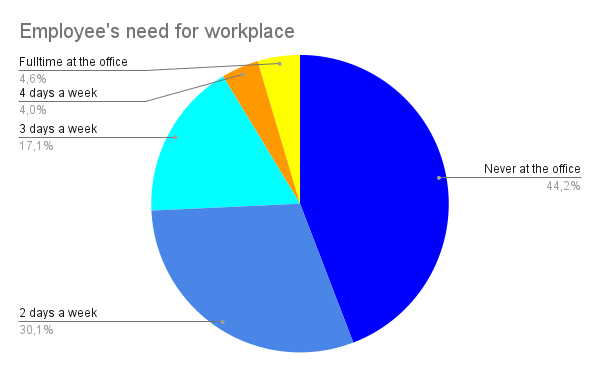Over a year after the pandemic began, the question of remote work vs. hybrid work remains top-of-mind for employees and employers alike. How many days should people return to the office, if at all? A recent LinkedIn poll by marketer Sandra Parker drew over 108,713 responses, reflecting how widespread and urgent this discussion has become. The poll asked participants about their preferred work arrangement post-COVID, and the results are telling.
Remote work versus Hybrid Workplaces: where do people wish to work


Employees’ Post-Pandemic Workplace Preferences


The LinkedIn survey results highlight a clear shift away from the traditional full-time office model:
Employee preferences for returning to the office, according to a LinkedIn poll (108k respondents):
44% would prefer never going back to their “dreaded cubicles,” indicating a large group (including many managers) favor full-time remote work.
47% would choose a hybrid schedule – specifically, working 2–3 days in the office and the rest remotely.
Less than 9% of respondents wanted to be in the office four days a week or more (essentially a near full-time return).
In other words, over 91% of workers favor either hybrid or fully remote arrangements, with the majority leaning toward a mix of home and office. This snapshot, taken roughly a year and a half into the pandemic, echoes a broader study by Statistics Canada that found similar preferencesmyseat.io. The key takeaway is that there is no mass desire to return to pre-pandemic office norms. Employees have experienced the benefits of remote work and are reluctant to give them up.
What If Companies Tried to Please Everyone?


These preferences aren’t just abstract percentages – they have real implications for workplace planning and costs. MySeat developed a hypothetical scenario assuming all 108,713 poll respondents worked at the same large organization that wanted to accommodate everyone’s wishes:
Impact of aligning office policy with employee preferences (hypothetical organization of 108k employees):
The company would need only 32,759 workstations to satisfy the demand, meaning it requires just 30% of the capacity it would have needed if everyone had a dedicated desk on-site. In other words, 70% of the office space could be eliminated or repurposed under an optimal hybrid policy.
In a city like Montreal, this translates to massive savings. The annual rental cost for the original fully occupied space (estimated at around $764.6M) could drop to roughly $230.4M if only 30% of desks are needed. This is a nearly 70% reduction in rent costs.
Companies could save even more by adopting flexible real estate strategies. For instance, using a 50/50 mix of permanent offices and co-working spaces would further cut costs to about $154.5M per year, and going with 100% co-working arrangements for that 30% capacity would cost roughly $78.6M – a fraction of the original budget.
The exercise above highlights an appealing triple bottom line benefit: fewer dedicated offices mean lower real estate costs, a potentially smaller environmental footprint (less energy usage for space that isn’t needed), and – if implemented thoughtfully – happier employees who get the flexibility they want.
Embracing Remote Work – Challenges and Considerations
While the advantages of remote and hybrid models are clear, not every organization finds the transition easy. Companies that had flexible work arrangements before COVID were better positioned to go fully remote when the crisis hit. With the right tools and mindset, they maintained productivity and have since comfortably adopted hybrid work models.
On the other hand, organizations forced into remote work suddenly, out of necessity, often had mixed results. Some struggled with technology adoption, culture, and management practices in a purely virtual environment. These growing pains are understandable – implementing a successful hybrid model requires agility and planning, not just flipping a switch. Companies learned that one size does not fit all; each had to iterate on policies to find what truly worked for their people and business.
Key steps for a smoother transition include:
Designing attractive office spaces that make employees actually want to come in for collaboration and socialization. The office should offer clear benefits (productive work zones, social areas, amenities) that remote setups can’t.
Continuously evaluating engagement and usage of the office. Simply opening the office doesn’t guarantee employees will return regularly. Organizations should use workplace analytics (like MySeat’s occupancy sensors and dashboards) to see which spaces and amenities are valued, and which go underused, then adjust accordingly.
How are companies looking at life post-pandemic?


How Are Companies Responding Post-Pandemic?
Employers across industries are taking varied approaches as they navigate this new landscape:
Different corporate approaches to post-pandemic work:
Many tech-forward companies have embraced long-term remote work. For example, a FlexJobs report lists numerous large firms that went either remote-first or remote-friendly permanentlymyseat.io. These companies trust that productivity can be maintained from anywhere and see remote work as a perk to attract talent.
Some organizations are launching formal hybrid work programs. Automaker Stellantis and the Royal Bank of Canada are notable examples rolling out hybrid initiatives. These typically involve employees splitting time between home and office, often with designated team days in-office.
A few high-profile companies have decided against remote work entirely. Notably, Goldman Sachs made headlines by demanding a full return to office, reflecting a belief that in-person work is critical to their culture or operations.
Only time will tell which strategies prove most effective, and the “right” approach may differ by industry or company culture. What’s clear is that going against employee preferences can backfire – many workers have shown they’re willing to change jobs to keep the flexibility they gained during the pandemic. The record rates of resignation in some sectors (“Great Resignation”) underscored that employees will seek out roles that fit their lifestyle and values.
The Future of Work is Flexible
The debate between remote and hybrid work is shaping the future of workplaces worldwide. The data strongly suggests that hybrid work models – ones that blend remote work with office time – are here to stay. Companies stand to benefit from reduced costs and potentially higher employee satisfaction, but they must remain agile. The most successful organizations will be those that continuously adapt their policies, spaces, and technologies to meet evolving needs.
Crucially, the pandemic has proven that many tasks can be done efficiently outside the traditional office. Moving forward, treating remote work not as an emergency exception but as a strategic component of workplace design will be key. Employers should focus on retaining the benefits discovered (like increased autonomy and work-life balance) while still fostering collaboration and company culture in new, creative ways.
In summary, there is no one-size-fits-all answer – each organization must find the right mix for its people. But one thing is certain: the old notion of everyone behind the same desk 8 hours a day is fading. The future of work is more flexible and employee-centric. Companies that listen to their employees’ preferences and leverage data-driven planning (for instance, using MySeat’s workplace analytics to right-size their office footprint) will be best positioned to thrive in this new landscape.
